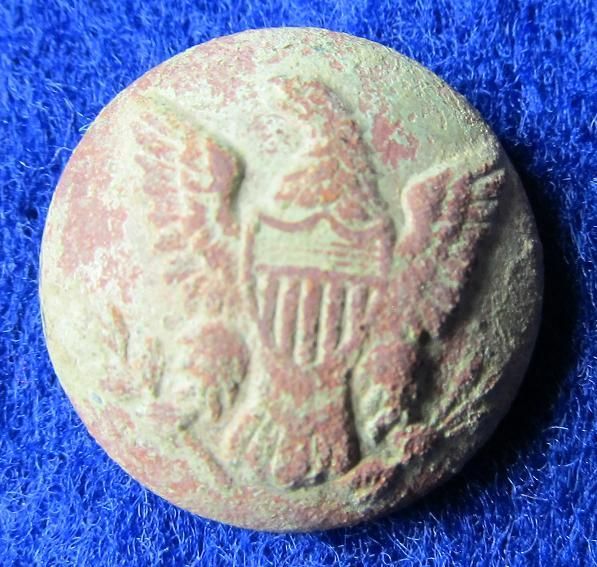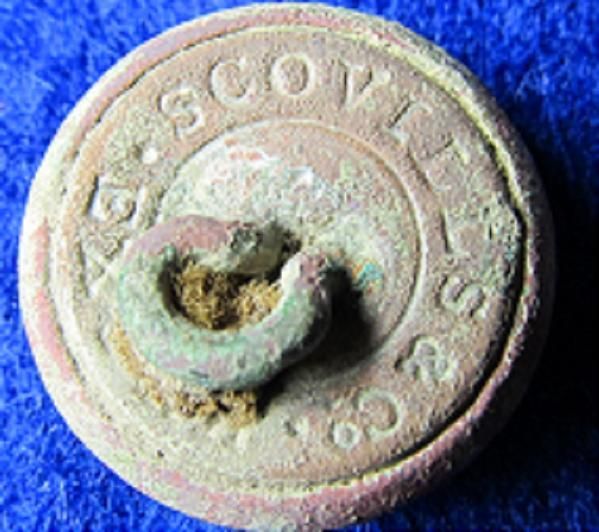Bell-Two
Active member
When we research a vanished home site sometimes we know of little else other than the name of the owner. And more often than not there is not much more information that can be found about them. In this case I was able to track down some more details about the original owner of this property and the tale he related about his service in the Civil War which resulted in his capture and imprisonment in several different Confederate prisons including the infamous Andersonville.
I was fortunate to find at this site a General Service Cuff Button, I believe that this has a strong possibility to have belonged to the gentleman in question. He returned from the war and his imprisonment in the dreaded Andersonville prison to return to this farm and he lived until 1917. Now it maybe possible this button was with him in Andersonville. Of course that can never be proved and I would never claim it was…but it is an intriguing thought none the less! Here is his account of his experience there.
(Township name redacted), furnished her quota of men, who went forth and offered their lives at their country's call. Her soldiers belonged to the various regiments, the history of which appears in another part of this work. We will not attempt to particularize; it would simply be impossible to refer in detail to the services performed by each individual. That the coming generation may form some idea of the terrible sufferings to which some of the soldiers were subjected, we append the following prison experience of (Redacted Name), Esq., told the writer by (Redacted Name). It was with much difficulty that he could be persuaded to relate these tales of prison life; "for," said he, "the story seems so exaggerated that no one will believe it." He says
"I was captured at the battle of Chickamauga, September 20, 1863, by Bragg's command. I was then a sound, healthy man, of one hundred and fifty pounds in weight. During fourteen months of prison life, I never had food enough to satisfy the cravings of hunger no, not one-fourth enough; at present I eat more in one day than was given me in a week then. While in ' Dixie's Prison,' we had a little soup made of black peas, which was frequently covered with bugs, parasites of the pea, swimming over the top of the bucket ; of this we received one pint per day to the man. It may have been seasoned with pork, but no one ever saw pork. Occasionally, we were regaled with two ounces of meat, so strong that a well fed dog would not have touched it. Of bread, we were given two ounces per day, and this constituted the daily bill of fare in prison, Virginia, in the capital of the boasted chivalry of the south.
"At Danville prison, we fared no better than at Richmond; here we spent what is known as the Todd new-year's, without coats, some without shoes, one thin blanket to three men and without fire. This was only a foretaste of the bliss (?) yet in store. The culminating point of the good things the confederacy had reserved for us was reached at Andersonville, Georgia. If the rebels could not conquer the hated Yank, they could at least starve him to death which was a surer, if not as manly a method of depriving him of his life. Our daily bill of fare, consisted of two ounces of corn-bread bran without any seasoning; we either got soup or with our meat. I often wondered if the meat they served to us was not some Noah prepared for his family on their journey on the world. They must have a race of hogs there, noted for longevity and the staying qualities of their meat. The dead house was made of brush, and there was hauled away daily, one or more wagon-loads of the dead martyrs of freedom, victims of starvation at the hands of their boasted chivalry-God save the name. From one hundred and eighty to one hundred and ninety deaths occurred each day, and the bodies of the deceased were hauled off an common board racks drawn by four mules, the dead being laid on cross-wise so long as a man would lay on. Whether the chivalry took the trouble to bury all of them or not, I do not know.
"I saw men shot there for crossing the dead line, when they were bereft of reason by starvation. A report was current in the prison that the guards were offered thirty clays furlough for shooting prisoners, a chivalrous (?) method of fighting; this was their idea of civilized warfare. Once saw a prisoner shot fifty yards inside of the dead line, who was calmly smoking his pipe, doing nothing contrary to the regulations of the prison. Our stockade was on the little stream of water running from the camp of our guards through our prison; they used it as a cesspool, and the filth of their camp was conveyed to us; green flies and maggots were thick on the banks of that blissful stream which furnished us water until we dug wells. The tents, in which they slept, in the prison yard, were made of canvass, stretched over perpendicular poles stuck in the ground or sand; the latter was so full of 'gray-backs' as to make it appear alive. The bodies of the prisoners were covered with wounds, caused by being bitten by the vermin."


I was fortunate to find at this site a General Service Cuff Button, I believe that this has a strong possibility to have belonged to the gentleman in question. He returned from the war and his imprisonment in the dreaded Andersonville prison to return to this farm and he lived until 1917. Now it maybe possible this button was with him in Andersonville. Of course that can never be proved and I would never claim it was…but it is an intriguing thought none the less! Here is his account of his experience there.
(Township name redacted), furnished her quota of men, who went forth and offered their lives at their country's call. Her soldiers belonged to the various regiments, the history of which appears in another part of this work. We will not attempt to particularize; it would simply be impossible to refer in detail to the services performed by each individual. That the coming generation may form some idea of the terrible sufferings to which some of the soldiers were subjected, we append the following prison experience of (Redacted Name), Esq., told the writer by (Redacted Name). It was with much difficulty that he could be persuaded to relate these tales of prison life; "for," said he, "the story seems so exaggerated that no one will believe it." He says
"I was captured at the battle of Chickamauga, September 20, 1863, by Bragg's command. I was then a sound, healthy man, of one hundred and fifty pounds in weight. During fourteen months of prison life, I never had food enough to satisfy the cravings of hunger no, not one-fourth enough; at present I eat more in one day than was given me in a week then. While in ' Dixie's Prison,' we had a little soup made of black peas, which was frequently covered with bugs, parasites of the pea, swimming over the top of the bucket ; of this we received one pint per day to the man. It may have been seasoned with pork, but no one ever saw pork. Occasionally, we were regaled with two ounces of meat, so strong that a well fed dog would not have touched it. Of bread, we were given two ounces per day, and this constituted the daily bill of fare in prison, Virginia, in the capital of the boasted chivalry of the south.
"At Danville prison, we fared no better than at Richmond; here we spent what is known as the Todd new-year's, without coats, some without shoes, one thin blanket to three men and without fire. This was only a foretaste of the bliss (?) yet in store. The culminating point of the good things the confederacy had reserved for us was reached at Andersonville, Georgia. If the rebels could not conquer the hated Yank, they could at least starve him to death which was a surer, if not as manly a method of depriving him of his life. Our daily bill of fare, consisted of two ounces of corn-bread bran without any seasoning; we either got soup or with our meat. I often wondered if the meat they served to us was not some Noah prepared for his family on their journey on the world. They must have a race of hogs there, noted for longevity and the staying qualities of their meat. The dead house was made of brush, and there was hauled away daily, one or more wagon-loads of the dead martyrs of freedom, victims of starvation at the hands of their boasted chivalry-God save the name. From one hundred and eighty to one hundred and ninety deaths occurred each day, and the bodies of the deceased were hauled off an common board racks drawn by four mules, the dead being laid on cross-wise so long as a man would lay on. Whether the chivalry took the trouble to bury all of them or not, I do not know.
"I saw men shot there for crossing the dead line, when they were bereft of reason by starvation. A report was current in the prison that the guards were offered thirty clays furlough for shooting prisoners, a chivalrous (?) method of fighting; this was their idea of civilized warfare. Once saw a prisoner shot fifty yards inside of the dead line, who was calmly smoking his pipe, doing nothing contrary to the regulations of the prison. Our stockade was on the little stream of water running from the camp of our guards through our prison; they used it as a cesspool, and the filth of their camp was conveyed to us; green flies and maggots were thick on the banks of that blissful stream which furnished us water until we dug wells. The tents, in which they slept, in the prison yard, were made of canvass, stretched over perpendicular poles stuck in the ground or sand; the latter was so full of 'gray-backs' as to make it appear alive. The bodies of the prisoners were covered with wounds, caused by being bitten by the vermin."





